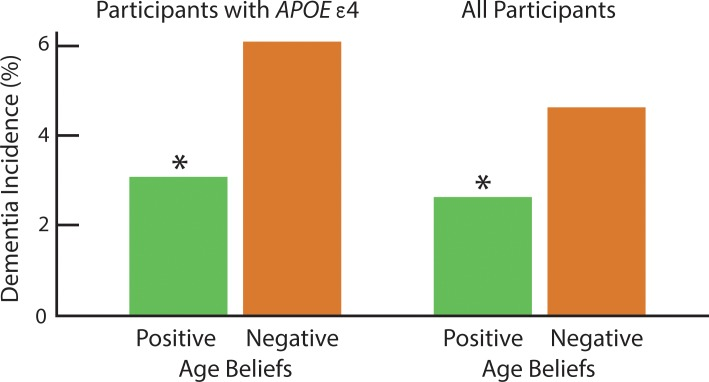“Census population estimates from July 2024 show about 98,000 centenarians in the US, about 75% of whom are women. This number has nearly tripled since 1990. The Census Bureau projects over 421,000 Americans to be at least 100 years old by 2054, making up 0.1% of the US population.”
This reminds me of a study I saw some time back (linked below) that looked at APOE ε4 carriers and found that those with positive age beliefs were almost 50% less likely to develop dementia than those with negative ones.
Aging can actually be a phase where we get stronger, and wiser.
Life’s better with both those things.
Interesting!. I’m curious about what exactly “positive age beliefs” are. So I did a little digging:
Predictor: Positive age beliefs
Age beliefs were assessed with the five-item Attitude toward Aging (ATA) subscale of the Philadelphia Geriatric Center Morale Scale (e.g., The older I get, the more useless I feel) [23, 24]. Potential responses range from strongly disagree to strongly agree. We reverse-scored responses, so that total scores ranged from 5 to 30, with a higher score indicating more-positive age beliefs. The scale has good internal and external validity [15, 23, 24]. The ATA was administered in 2008 to a random half of the HRS participants and to the other half in 2010 [25].
See:
-
Things keep getting worse as I get older.
-
I have as much pep as I had last year.
-
How much do you feel lonely? Not much_____ A lot_____
-
Little things bother me more this year.
-
I see enough of my friends and relatives.
-
As you get older‚ you are less useful.
-
I sometimes worry so much that I can’t sleep.
-
As I get older‚ things are (better/worse) than I thought they would be. Better_____ Worse_____
-
I sometimes feel that life isn’t worth living.
-
I am as happy now as I was when I was younger.
-
I have a lot to be sad about.
-
I am afraid of a lot of things.
-
I get mad more than I used to.
-
Life is hard for me much of the time.
-
How satisfied are you with your life today? Satisfied _____ Not satisfied____
-
I take things hard.
-
I get upset easily.
-
If you could live where you wanted‚ where would you live?*
-
Most days I have plenty to do*
-
People had it better in the old days*
-
My health is (good‚ not so good)*
-
A person has to live for today and not worry about tomorrow*
-
Do things keep getting worse as you get older?
-
Do you have as much pep as you had last year?
-
How much do you feel lonely? Not much‚ A lot
-
Do little things bother you more this year?
-
Do you see enough of your friends and relatives?
-
Do you feel that as you get older you are less useful?
-
Do you sometimes worry so much that you can’t sleep?
-
As you get older‚ are things than you thought? Better‚ worse or Same
-
Do you sometimes feel that life isn’t worth living?
-
Are you as happy now as you were when you were younger?
-
Do you have a lot to be sad about?
-
Are you afraid of a lot of things?
-
Do you get mad more than you used to?
-
Is life hard much of the time?
-
How satisfied are you with your life today? Satisfied‚ Not Satisfied
-
Do you take things hard?
-
Do you get upset easily?
Full details and scoring here:
lawtons-pgc-moral-scale.pdf (28.1 KB)
if your body and mind are already falling apart, would you have a positive age belief?
Appreciate you pulling this together.
Makes me wonder: is it the belief that boosts resilience, or does resilience foster the belief?
Maybe it’s bi-directional—but which one’s the lead domino?
Likely bidirectional
Beliefs and expectations can trigger real physiological changes in the body, activating natural healing processes or altering responses to treatments and behaviors.
The effect is not limited to medicine; it extends to exercise, diet, and even how we respond to stress.
E.g., its been shown that activating the main smile muscles (like the zygomaticus major and orbicularis oculi) sends signals to the brain that stimulate the release of endorphins and reduce stress hormones such as cortisol, leading to improved mood and relaxation.
Ally Crum from Stanford has done lots of work on belief effects.
